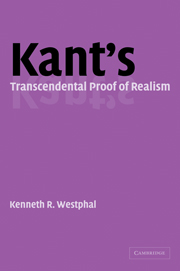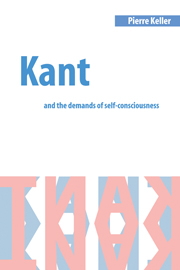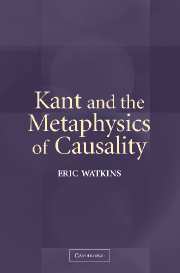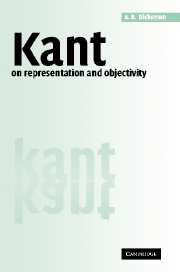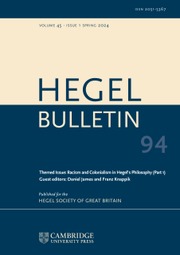Kant's Transcendental Proof of Realism
- Author: Kenneth R. Westphal, University of East Anglia
- Date Published: April 2009
- availability: Available
- format: Paperback
- isbn: 9780521108928
Paperback
Other available formats:
Hardback, eBook
Looking for an inspection copy?
This title is not currently available on inspection
-
This book is the first detailed study of Kant's method of 'transcendental reflection' and its use in the Critique of Pure Reason to identify our basic human cognitive capacities, and to justify Kant's transcendental proofs of the necessary a priori conditions for the possibility of self-conscious human experience. Kenneth Westphal, in a closely argued internal critique of Kant's analysis, shows that if we take Kant's project seriously in its own terms, the result is not transcendental idealism but (unqualified) realism regarding physical objects. Westphal attends to neglected topics - Kant's analyses of the transcendental affinity of the sensory manifold, the 'lifelessness of matter', fallibilism, the semantics of cognitive reference, four externalist aspects of Kant's views, and the importance of Kant's Metaphysical Foundations for the Critique of Pure Reason - that illuminate Kant's enterprise in new and valuable ways. His book will appeal to all who are interested in Kant's theoretical philosophy.
Read more- The first detailed, internal critique of Kant's transcendental idealism
- The first detailed study of Kant's method of 'transcendental reflection' and his use of it in the Critique of Pure Reason
- Contributes equally to epistemology and to Kant scholarship
Reviews & endorsements
'This is an important contribution to the contemporary literature on Kant's theoretical philosophy. The book is distinguished by a novel main claim, an impressive grip on the relevant secondary literature (both past and present), a close examination of some typically neglected (but important) passages in the Critique of Pure Reason, and a sustained, rigorous, and lucid argument. No one, so far as I know, has argued for Kant's 'realism' in such a thorough way. Given both the novelty of the claim and the care with which it is supported, all future interpreters of Kant will have to take Westphal into account.' Gordon Brittain, Montana State University
See more reviews'… stimulating book. This is a book as rich as it is bold. I will certainly return to Kant's Transcendental Proof of Realism, and I recommend it wholeheartedly.' British Journal for the History of Philosophy
Customer reviews
Not yet reviewed
Be the first to review
Review was not posted due to profanity
×Product details
- Date Published: April 2009
- format: Paperback
- isbn: 9780521108928
- length: 312 pages
- dimensions: 229 x 152 x 18 mm
- weight: 0.46kg
- availability: Available
Table of Contents
Introduction
1. Kant's methods: transcendental and epistemic reflection
2. The metaphysics of Kant's transcendental idealism
3. Transcendental affinity
4. The gap in Kant's Critique of Pure Reason
5. Kant's dynamic misconstructions
6. Kant's metaphysical proof of the law of inertia
7. Three Kantian insights
Appendix. Summary of Kant's Transcendental Proof of the Legitimacy of Causal Judgments.
Sorry, this resource is locked
Please register or sign in to request access. If you are having problems accessing these resources please email [email protected]
Register Sign in» Proceed
You are now leaving the Cambridge University Press website. Your eBook purchase and download will be completed by our partner www.ebooks.com. Please see the permission section of the www.ebooks.com catalogue page for details of the print & copy limits on our eBooks.
Continue ×Are you sure you want to delete your account?
This cannot be undone.
Thank you for your feedback which will help us improve our service.
If you requested a response, we will make sure to get back to you shortly.
×
